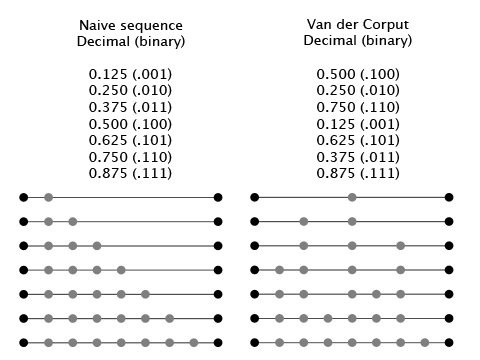Lately I have been looking for a solid way to create a robust implementation moving a spaceship from one point to another. This turned out to be a hard problem, and led me to a lot of new literature, which included Steven M. LaValle’s Planning Algorithms. Randomly reading from it I found a small gem called the van der Corput sequence.
The van der Corput sequence is useful for sampling in an interval. LaValle discusses it as an option to random sampling within the context of sampling for planning algorithms. I had thought about similar issues in the context of root finding, where I always wondered how to predictably generate a sequence that would distribute samples evenly over an interval, as well as do so in a manner that would not “favor” parts of the interval over others.
One naive way to sample over an interval, is to split the interval in X pieces and do the samples in order. If X is 8 and this method is used the interval would be explored as shown to the left in the figure below (clearly this means the the early parts of the interval will be explored first). Using the van der Corput sequence would result in exploration as seen on the right (which explores the interval much more evenly).

Generating the van der Corput sequence is surprisingly simple and elegant, just flip the bits of the naive sequence as seen in the binary column above. I find this very peculiar, since mirrored donkeys do not normally turn into cheetahs.
The great properties of this sequence is that whenever you end it, it will have explored the interval pretty evenly. A second nice property is that you can easily continue the sequence beyond an initial size, by creating the naive sequence at the position you want to start from, and keep reversing the results.
This method will definitely go into my toolbox of things to consider whenever I am thinking about using random sampling.
